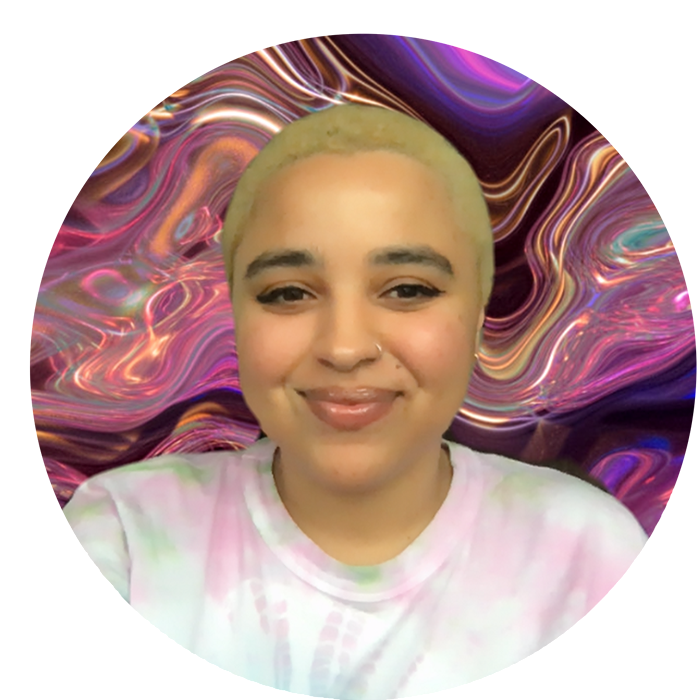"Whatever, dude," laughed Tyler, the Creator into the mic, looking at the crowd. "We all sweaty, nigga, we all sweaty together. Shit all open and shit."
Tyler was alone onstage, performing the entirety of his sixth album, Igor, in what looked like the inside of an old velvet jewelry box for an Apple Music livestream earlier this year. Apparently it was really fucking hot, because his blond wig was stringy and soaked in sweat. He lightly patted down the bangs.
His bare chest, visible beneath a powder-blue two-piece suit and gold chains, glistened. He chuckled as he licked his grill. Then the music for "Puppet" cued back up and Tyler's mood immediately shifted from jocular to earnest.
His eyes widened as he launched into the dark, amour fou–themed track, nearly hyperventilating through the lines "I want your company, I need your company / I want you to want from me / I can't maneuver without you next to me / It's so complex to me."
There's a vulnerability, a neediness from Tyler in this performance—and in the album as a whole. After becoming a pop-culture sensation as a teen, and after nearly a decade of trolling the world at large, the California rapper has blossomed into his maturity and seems to be embracing the role of a serious artist. It's a major flex.
Igor dropped in May, debuting at number one on the Billboard 200. The album is Tyler's first number-one record, and it's the first fully self-arranged and self-produced album by a solo rapper to come out on top of the charts.
The album marks an important step in the evolution of Tyler, the Creator. The rapper first came into the spotlight in 2007 as the rambunctious teenage ringleader of Odd Future, a now mostly defunct Los Angeles–based rap collective that has spawned such musicians as Frank Ocean, Earl Sweatshirt, and Syd. Known for their punk antics, explicitly sexual and violent lyrics, and general hooliganism, there was a certain edge to their ideas that carries over into their artistry today.
The urgent question surrounding his latest album is: Who is Igor? The face Tyler presents to us on the LP's cover channels Grace Jones's influential 1981 pop album Nightclubbing—the stylized hair, the skin color, the inscrutable expression.
Instead of Jones's cigarette, the more millennial-appropriate grill glints between Tyler's lips. Already the rapper is visually cueing to us, the listeners, what he's trying to embody in this most recent record—a persona that's all feeling, immediately iconic, relevant.
But in his live performances and videos, another Igor emerges. Who is this Warhol-channeling, 1980s-inspired, queerish, corny-suited, bleached-Anton-Chigurh-with-bangs-looking motherfucker? In an interview with Zane Lowe for Beats 1, Tyler does not confess to some convoluted backstory about his character or his aesthetics: "Bruh, I just thought it was cool," he said.
Tyler had been drawing on the character of Igor for three years, putting it in a stop-motion video he made for his show Nuts + Bolts on Vice in 2017, but with black hair and a turtleneck. "I just thought it would be a cool character, just tall, slim, suit, blond hair," said Tyler. "And black dudes don't really have hair like that."
Tyler's solo career has broadly relied on the shocking and confrontational, represented by a different persona with each release. His breakthrough album Goblin (2011) was typified by the ski mask. In 2013's Wolf, Tyler preferred a summer-camp aesthetic, while 2015's Cherry Bomb—Tyler's least celebrated and most sonically grating album—found him committing to a melting pink cartoon face.
Igor, his artiest and most beguiling release to date, loosely follows its titular character and his messy and possibly unrequited feelings for a boy. While the album's second track, "Earfquake," is a straightforward, soul-inspired love song (originally written for Justin Bieber), the threads of affection begin to unspool pretty quickly.
In "A Boy Is a Gun," which samples "Bound" by Ponderosa Twins Plus One (most memorably tapped in Kanye West's "us-against-the-world" track "Bound 2"), Tyler/Igor seems to have realized the poisonous effect of this boy: "You so motherfuckin' dangerous / You got me by my neck. (A boy is a gun.)" By the end, in the lo-fi, pitched-up "I Don't Love You Anymore," he declares the end of love.
As a casual Tyler listener, his earnestness in revealing Igor, and thus himself, is compelling. It gets me thinking about that comma in his name—Tyler, the Creator. It forces a pause, a consideration. It's not just some descriptor, but a title, a degree, an honorific.
When talking to Lowe about the intentionality behind putting "All songs written, produced, and arranged by Tyler Okonma" on the cover, Tyler explained: "I'm thinking 15 years from now. I'm playing the long game." He continued: "I need people to know that this is the full idea. Everything is very particular." Tyler, the Creator's strength is in his commitment to his ideas and the universes he creates. His performance at Bumbershoot this year is likely to be better for it.














